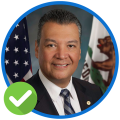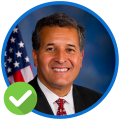Elect Kent Lee for San Diego City Council to put San Diego on the right track for progress.
Kent Lee’s policy positions demonstrate that he will be a progressive voice for the constituents of City Council District 6 and will govern effectively in the best interest of this diverse district.
Progressive endorsements: Lee has the endorsement of many progressive groups, including Planned Parenthood Action Fund of the Pacific Southwest, YIMBY Democrats of San Diego County, and many union organizations. He has also received the endorsement of many local leaders, including San Diego Mayor Todd Gloria, State Treasurer Fiona Ma, Assemblymember Evan Low, and six members of the San Diego City Council.
Electoral history: Lee has not run for public office previously.
Top issues: Homelessness and housing, neighborhood services, public transit and infrastructure, economic growth, public safety, and support for the Convoy Pan Asian Cultural and Business Innovation District.
Governance and community leadership experience: Lee is a nonprofit executive, which he does to bring leadership and enrichment to his community. After providing volunteer support to several local organizations during college, Lee started his professional career with the Boy Scouts of America, where he worked directly with community members to execute youth programs and eventually rose to serve as a chief financial and development executive. He now serves as the executive director of Pacific Arts Movement, which is the largest organization serving Asian, Asian American, and Pacific Islander films on the continent. This work allows Lee to work at the intersection of arts programming and AAPI representation, to expand programs to meet the needs of the diverse San Diego community, and to lead an organization with a significant budget footprint. Outside his professional work, Lee has volunteered his time with several local organizations, including with the Asian Business Association of San Diego and the Mira Mesa Community Planning Group, and as a member of the UCSD’s Chancellor’s Community Advisory Board.
Other background: Lee, a nonprofit executive, has lived in San Diego all of his adult life. He is a first-generation American.
The Race
Primary election results: The June 2022 results included Kent Lee, 41%; Tommy Hough, 37%; and Jane Glasson, 22%. Kent Lee and Tommy Hough will compete in a run-off in the November 8 general election.
Candidate fundraising and pledges: Lee’s campaign has raised $240,000 and is not funded by real estate, corporate PAC, fossil fuel, or police interests.
Opposing candidate: Tommy Hough
Opposing candidate’s fundraising and pledges: Hough’s campaign has raised $63,300 and is not funded by real estate, corporate PAC, fossil fuel, or police interests.
The District
City: San Diego is San Diego County’s most populous city. San Diego’s City Council District 6 includes Clairemont Mesa, Kearny Mesa, Mira Mesa, Rancho Peñasquitos, and Sorrento Valley.
Governance structure: San Diego’s City Council oversees the needs of 1.4 million people and manages an estimated operating budget of $1.95 billion annually. San Diego is managed by a mayor-council structured government.
The Position
San Diego is governed by a nine-member city council. A city council is responsible for establishing policy, passing local laws (called ordinances), voting on budget appropriations, and developing an overall vision for the city. City council members in San Diego are limited to two terms, or eight years in office total.
Elect Kent Lee for San Diego City Council to put San Diego on the right track for progress.
Kent Lee’s policy positions demonstrate that he will be a progressive voice for the constituents of City Council District 6 and will govern effectively in the best interest of this diverse district.
Progressive endorsements: Lee has the endorsement of many progressive groups, including Planned Parenthood Action Fund of the Pacific Southwest, YIMBY Democrats of San Diego County, and many union organizations. He has also received the endorsement of many local leaders, including San Diego Mayor Todd Gloria, State Treasurer Fiona Ma, Assemblymember Evan Low, and six members of the San Diego City Council.
Electoral history: Lee has not run for public office previously.
Top issues: Homelessness and housing, neighborhood services, public transit and infrastructure, economic growth, public safety, and support for the Convoy Pan Asian Cultural and Business Innovation District.
Governance and community leadership experience: Lee is a nonprofit executive, which he does to bring leadership and enrichment to his community. After providing volunteer support to several local organizations during college, Lee started his professional career with the Boy Scouts of America, where he worked directly with community members to execute youth programs and eventually rose to serve as a chief financial and development executive. He now serves as the executive director of Pacific Arts Movement, which is the largest organization serving Asian, Asian American, and Pacific Islander films on the continent. This work allows Lee to work at the intersection of arts programming and AAPI representation, to expand programs to meet the needs of the diverse San Diego community, and to lead an organization with a significant budget footprint. Outside his professional work, Lee has volunteered his time with several local organizations, including with the Asian Business Association of San Diego and the Mira Mesa Community Planning Group, and as a member of the UCSD’s Chancellor’s Community Advisory Board.
Other background: Lee, a nonprofit executive, has lived in San Diego all of his adult life. He is a first-generation American.
The Race
Primary election results: The June 2022 results included Kent Lee, 41%; Tommy Hough, 37%; and Jane Glasson, 22%. Kent Lee and Tommy Hough will compete in a run-off in the November 8 general election.
Candidate fundraising and pledges: Lee’s campaign has raised $240,000 and is not funded by real estate, corporate PAC, fossil fuel, or police interests.
Opposing candidate: Tommy Hough
Opposing candidate’s fundraising and pledges: Hough’s campaign has raised $63,300 and is not funded by real estate, corporate PAC, fossil fuel, or police interests.
The District
City: San Diego is San Diego County’s most populous city. San Diego’s City Council District 6 includes Clairemont Mesa, Kearny Mesa, Mira Mesa, Rancho Peñasquitos, and Sorrento Valley.
Governance structure: San Diego’s City Council oversees the needs of 1.4 million people and manages an estimated operating budget of $1.95 billion annually. San Diego is managed by a mayor-council structured government.
The Position
San Diego is governed by a nine-member city council. A city council is responsible for establishing policy, passing local laws (called ordinances), voting on budget appropriations, and developing an overall vision for the city. City council members in San Diego are limited to two terms, or eight years in office total.
























